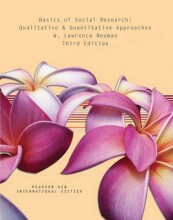Try our study magic for free
Summary: Basics Of Social Research: ... | 9781292020341 | Lawrence W Neuman
- This + 400k other summaries
- A unique study and practice tool
- Never study anything twice again
- Get the grades you hope for
- 100% sure, 100% understanding
Remember faster, study better. Scientifically proven.
a PDF, study it super fast
- No sign up, email or credit card needed!
- AI makes unlimited flashcards
- Get unlimited quizzes and tests
- Ask AI anything
Create a notebook
- No sign up, email or credit card needed!
- Have and keep perfect overview
- Make flashcards, notes and mind maps
- Review, test and score!
Read the summary and the most important questions on Basics of Social Research: Pearson New International Edition Qualitative and Quantitative Approaches | 9781292020341 | Lawrence W. Neuman
-
1 Doing Social Research
-
1.1 Introduction
-
Why do we do social research?
- To learn something new about the world.
- To carefully document our guesses, hunches, theories or beliefs about it.
- To understand how the social world works.
-
How do we produce knowledge in the process of social research?
By combining principles, outlooks and ideas with a collection of specific practices, techniques and strategies. -
1.2 Alternatives to Social Research
-
What is the biggest difference between research-based knowledge and the alternatives?
Research-based knowledge has fewer flaws and avoids common mistakes. -
1.2.1 Authority
-
When are you relying on authority as a basis for knowledge?
When you accept something as true because someone in a position of authority says it is true or because itappears in aauthoritative outlet . -
What are the three limitations of relying on authority?
- It is easy to overestimate the expertise of others.
- Authorities may not agree, and not all authorities are equally dependable.
- Authorities may speak on fields which they know little about.
- It is easy to overestimate the expertise of others.
-
Name two issues of relying on authority.
- Misuse of authority.
- Too much reliance on authorities can be dangerous to a democratic society.
- Misuse of authority.
-
1.2.2 Tradition
This is a preview. There are 1 more flashcards available for chapter 1.2.2
Show more cards here -
Why do people sometimes cling to traditional knowledge without understanding?
Because they assume that if something may have worked or been true in the past, it will continue to be true. -
1.2.3 Common sense
-
What is gaining knowledge through common sense?
Telying on what everyone knwos and waht ''just makes sense''. -
Name two downsides of using common sense to gain knowledge.
- It allows logical fallacies to slip into thinking.
- It contains contradictory ideas that often go unnoticed because people use the ideas at different times.
- It allows logical fallacies to slip into thinking.
-
1.2.4 Media Distortion
This is a preview. There are 2 more flashcards available for chapter 1.2.4
Show more cards here -
What is the downsides of mass media?
- It tends to perpetuate a
culture's misconceptions and myths. - It can create a belief that a serious problem exists when it may not.
- It tends to perpetuate a
Read the full summary
This summary +380.000 other summaries A unique study tool A rehearsal system for this summary Studycoaching with videos
- Higher grades + faster learning
- Never study anything twice
- 100% sure, 100% understanding
Topics related to Summary: Basics Of Social Research: ...
-
Doing Social Research - Alternatives to Social Research - Personal Experience
-
Doing Social Research - How Science Works
-
Doing Social Research - Dimensions of Research - Use of Research
-
Doing Social Research - Dimensions of Research - Data Collection Techniques and Study Designs
-
Theory and Social Research - The Parts of Theory
-
Theory and Social Research - The Aspects of Theory - Forms of Explanation
-
Theory and Social Research - The Three Major Approaches to Social Science
-
Ethics in Social Research - Why be ethical?
-
Ethics in Social Research - Ethical issues involving research participants
-
Ethics in Social Research - Ethics and the sponsors of research
-
Reviewing the Scholarly Literature and Planning a Study
-
Qualitative and Quantitative Measurement - Parts of the measurement process
-
Qualitative and Quantitative Measurement - Reliability and validity
-
Qualitative and Quantitative Measurement - A guide to quantitative measurement - Levels of measurement
-
Qualitative and Quantitative Measurement - A guide to quantitative measurement - Specialized measures: scales and indexes
-
Qualitative and Quantitative Measurement - Index construction
-
Qualitative and Quantitative Measurement - Scales - Commonly used scales
-
Qualitative and Quantitative Sampling
-
Survey Research - When to use a survey
-
Survey Research - The logic of survey research - What is a survey?
-
Survey Research - Constructing the questionnaire
-
Survey Research - Types of surveys: advantages and disadvantages
-
Survey Research - Interviewing
-
Survey Research - The ethical survey































